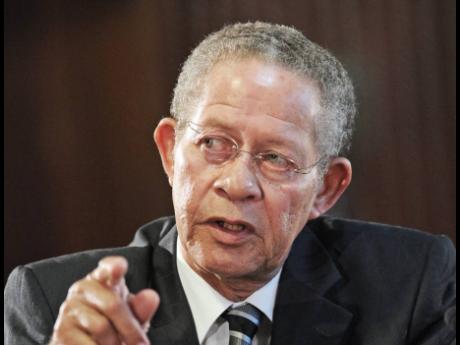30-DAY SOE ON TABLE
Former PM Golding says legislators could consider compromise in lengthening initial period
With the Opposition blocking the Government’s attempt to extend the current states of emergency (SOEs) beyond two weeks, former Prime Minister Bruce Golding says a constitutional amendment could be considered to allow for an initial period of up to...
With the Opposition blocking the Government’s attempt to extend the current states of emergency (SOEs) beyond two weeks, former Prime Minister Bruce Golding says a constitutional amendment could be considered to allow for an initial period of up to 30 days.
But the former head of government, whose administration presided over the passage of the Charter of Fundamental Rights and Freedoms in March 2011, said he is averse to any change to the two-thirds majority in both houses of Parliament to allow for the extension of SOEs.
“The only compromise I would be prepared to consider is whether the two-week period needs to be extended,” Golding told The Gleaner on Monday.
“Maybe two weeks is too short a time for a state of emergency to be effective. Maybe that could be extended, but I certainly wouldn’t want to give a Government the power to have a state of emergency in place and to just simply extend it at will without going to Parliament,” the former prime minister said.
Golding said that the two-thirds requirement in the Senate was inscribed to ensure that notwithstanding the overwhelming majority of a government in the Lower House, there is a limit to its power to unilaterally make constitutional changes in the Upper House.
“That stipulation was put in because of the experience we had with the 1976 state of emergency, which was used for raw political purposes. The Government then had the power to extend it and to keep extending it up to a year,” he recalled.
He said the requirement was inserted to put some brakes on the power of a government to use the measure for an extended period, “particularly if you have a tyrannical government, what you would be doing is unleashing tyranny on the people where some of the fundamental rights of the people are suspended”.
The former prime minister said he would never want the country to return to a situation similar to the SOE of 1976 when “people’s rights were just trampled on”.
He said that the then minister of national security had signed several blank detention orders, which left the police and army to fill in the names.
“No consideration was given to whether or not this person really ought to be detained. We can’t run the risk of going back to that. There is no point in saying that no government would in conscience do that ... . We can’t trust the rights of people to the conscience of any government. We have to put in belt and braces.”
Any move to amend the Constitution to allow for the initial 14-day period for SOEs to be changed to an initial 30-day stretch would also require a two-thirds majority vote in both Houses.
But Golding made it clear that once the current SOEs expire at midnight Tuesday, the Government was constitutionally unrestrained from declaring a new round.
“The Government is free to do that and come tomorrow (today) when it expires they can declare a new state of emergency,” he insisted.
Speaking to journalists at an SOE checkpoint at Langston Road in Kingston on Monday, Prime Minister Andrew Holness said that his administration was considering reimposing a new round of emergency measures.
“It is certainly being contemplated by the Government to declare a new SOE. It is well within our Constitution so to do to make a declaration under new circumstances and with new advice. We are watching the situation very carefully to see whether or not there are any adverse changes as a result of the SOE coming to an end,” he said.
Holness, who attended the Central Executive meeting of the Jamaica Labour Party at Belmont Road in New Kingston on Sunday, commented on the current structure of the Constitution that requires a two-thirds majority to extend SOEs in the bicameral legislature.
“I am not here to question the Constitution. That’s not what I am here to do, but I am here to point out that there have been times in our history when it is clear that there are issues that require adjustment for the Constitution to properly serve the challenges of the times,” Holness said.

